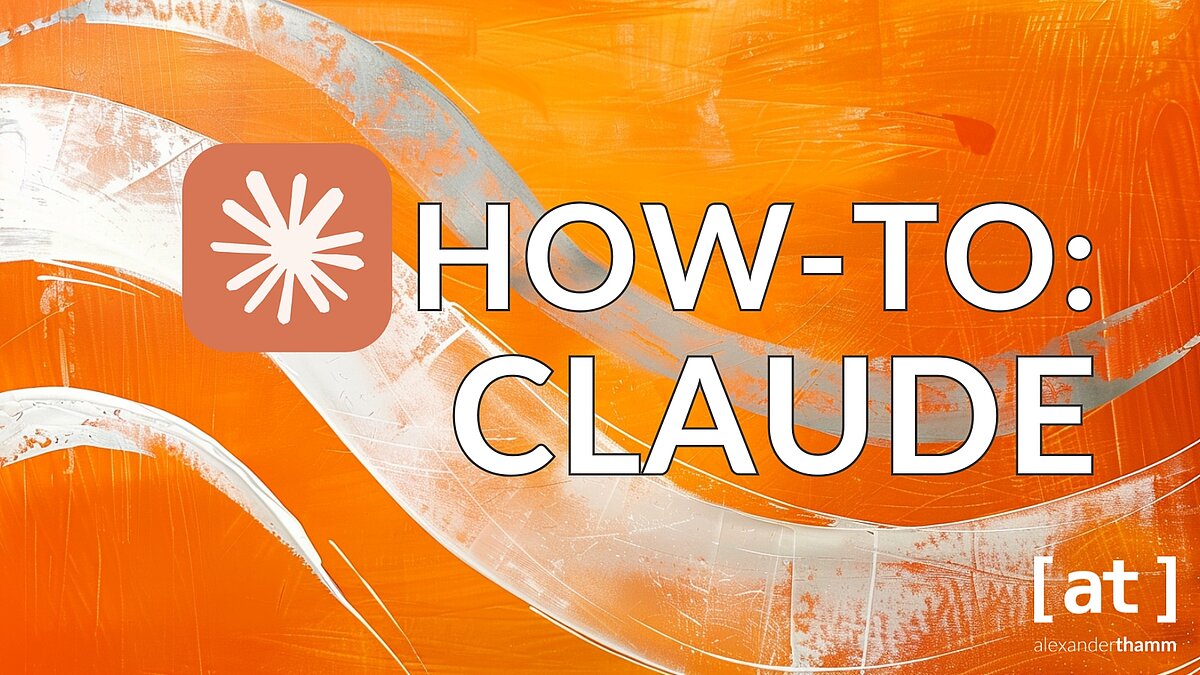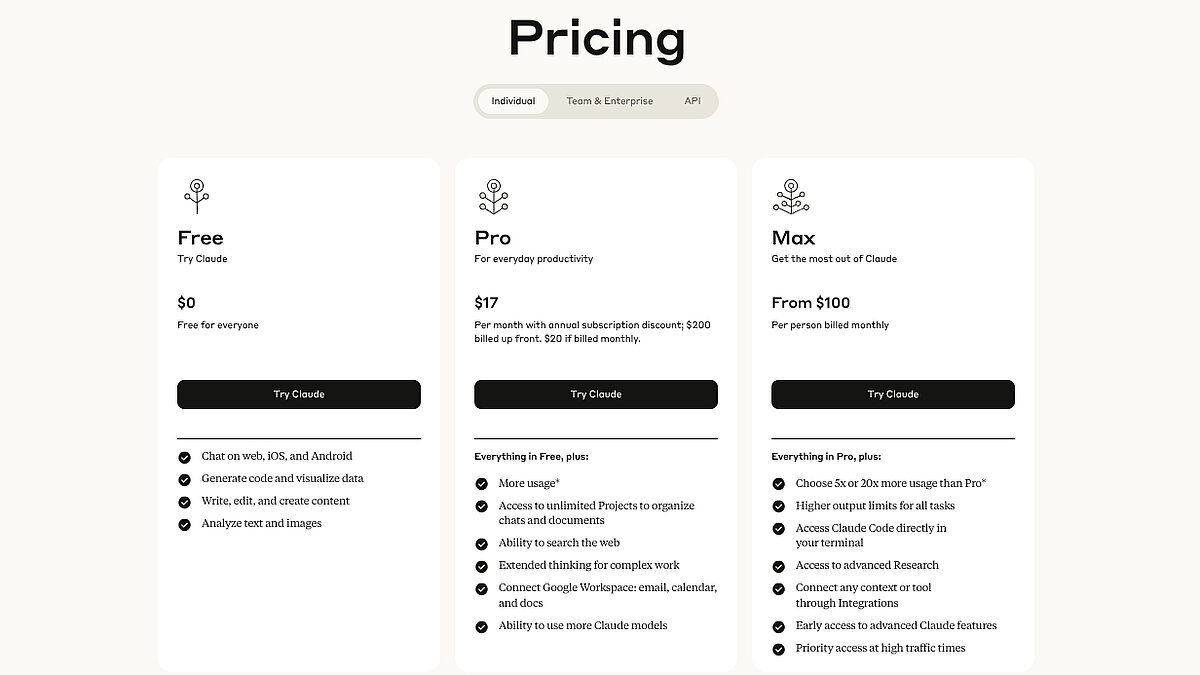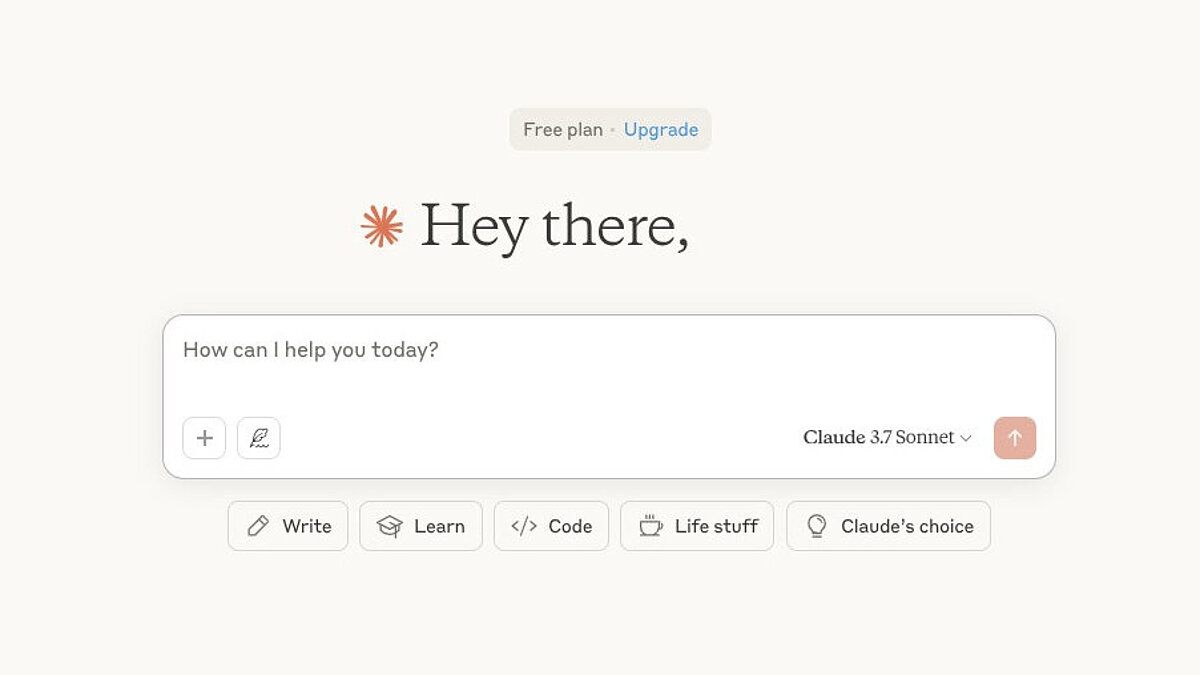Table of Contents

Artificial Intelligence (AI) is one of the most important and most discussed topics of our time. Nowadays, there are many powerful models–but only a few focus on security, ethics and transparency as consistently as Claude. It goes beyond mere efficiency and focuses on a crucial question: How can AI act reliably, trustworthy and responsibly?
This guide aims to clarify how Claude can be used, what strengths it has and for which use cases it is best suited.
What is Claude?
Claude is an AI-powered text and code generator developed by the US company Anthropic. It was named after Claude Shannon, the father of information theory. Similar to ChatGPT from OpenAI or Gemini from Google, Claude helps users to compose texts, write code, summarize information or analyze data. Claude’s focus is primarily on security, ethics and user-friendliness.
Anthropic was founded in 2021 by former OpenAI employees. Anthropic's goal is to develop “responsible AI”. The company pursues a constitutional AI approach: Anthropic's AI models learn to behave safely, helpfully and ethically based on predefined principles.
How does Claude work?
Claude is based on Large Language Models (LLMs) trained on billions of text data. The technical basis is similar to a GPT (Generative Pretrained Transformer) but differs in the training approach: While classic LLMs are often optimized based on human feedback (e.g., via Reinforcement Learning with Human Feedback, RLHF), Claude also uses constitutional guidance called "Constitutional AI". This provides rules and ethical principles as guidelines according to which the model independently evaluates decisions. Through strict self-regulation, advanced filtering mechanisms and a deep understanding of context, Claude minimizes the risk of misinformation, bias and harmful content without sacrificing precision or versatility.
Claude vs ChatGPT
Choosing the right AI assistant depends heavily on the respective requirements and use cases. Both Claude and ChatGPT are among the leading language models on the market–but differ in some key points. The following table provides a compact overview of the most important features of both systems.
| Aspect | Claude | ChatGPT |
|---|---|---|
| Technical performance | • Greater accuracy for complex tasks • Better contextual depth of understanding • Stronger in analytical tasks | • Very good generation of text and code • Strong creative skills • Faster response times |
| Context window size | • Up to 200,000 tokens • Ideal for analyzing very long documents and complex workflows | • Up to 128,000 tokens • Also enables the processing of large texts, but with a smaller window |
| Data protection | • Strong focus on ethical AI and data protection • Developed with principles of Constitutional AI • Less data collection for training | • Standard storage of user data • More data exchange for model improvement • More complex data protection regulations |
| Ethical orientation | • Explicit focus on ethical behavior • Transparent development principles • Less risk of problematic output | • Standard security filters • More restrictions on sensitive topics • Less transparent development process |
| Specific strengths | • Evaluating scientific and academic texts • Programming tasks with high complexity • "Extended Thinking Mode": for deeper analysis and structured answers • Particularly good at organizing and managing tasks | • Creative writing and quick text generation • Wide applicability in everyday tasks • Provides personalized responses by remembering user preferences • Can access current information from the Internet |
Both models offer powerful features, with Claude being particularly suitable for large-scale document processing and data-intensive research in industries such as law, finance and healthcare.
The strengths of ChatGPT lie in general and creative applications such as marketing, education and customer service.
How can I use Claude?
Claude is available as a web application on all internet-enabled devices. There is also an official app for iOS and Android. Registration is done via claude/login: Simply register for free with an email address or a Google account, enter your full name and mobile phone number and your first chat with the AI can start.
Costs
The free basic version of Claude is available to all users, but with certain usage limits. The number of messages that can be sent daily is limited and access may be restricted during busy times.
For more extensive applications, the paid plans offer expanded features and higher usage quotas:
- Pro: For $17 per month, users get significantly more usage capacity, access to advanced models such as Claude 3.5 Opus, a context window of 200,000 tokens, as well as features such as projects, knowledge bases, and high-load priority.
- Max: For heavy users there are two options: five times or even twenty times the usage compared to the Pro plan starting at $100 per month. It is ideal for professional power users with high needs.
- Team: This plan is aimed at groups of five or more people. It includes all the benefits of the Pro plan and offers additional management tools and better collaboration features for teams.
- Enterprise: There is an Enterprise plan for large organizations. It can be negotiated individually and contains all team functions plus additional security and integration functions, for example with GitHub or via SSO.

Which models does Anthropic offer?
With the Claude 3 model family, Anthropic currently offers three solutions with different levels of performance. From the fast Haiku variant to the complex-oriented Opus model, Claude 3 covers a wide range of applications:
| Model | Function | Parameter | Costs | Special Features |
|---|---|---|---|---|
| Claude 3.5 Sonnet | Analysis and semi-complex problem solutions | Estimated 175B parameters | Pay-per-Token (ca. $10/1M Input-Token, $50/1M Output-Token) | Combination of performance and speed |
| Claude 3 Opus | Currently the most powerful model, excellent in coding, analysis and creative solutions | Estimated 200B+ parameters | Pay-per-Token (ca. $15/1M Input-Token, $75/1M Output-Token) | High-performance model optimized for complex tasks and creative work |
| Claude 3.5 Haiku | For fast, precise answers | Estimated 50-75B parameters | Pay-per-Token (ca. $0.25/1M Input-Token, $1.25/1M Output-Token) | Extremely fast and cost-effective model |
As of April 2025
Prompting in Claude for beginners
Prompts are instructions or questions typed directly into Claude's chat window. Claude then processes the prompt and provides an appropriate answer.

Structure of the user interface:
Claude's interface is designed to provide intuitive interaction. Central elements are:
- Input field: The text field in which the prompts are entered is located at the bottom of the interface.
- Chat history: In the main area, Claude's previous entries and answers are displayed chronologically, which preserves the context of the conversation.
- Customization options: Depending on the version, additional features may be available, such as file upload, model type selection (Haiku, Sonnet and Opus), and customizing response styles.
Tips for effective prompts with Claude
Various prompting techniques help to get precise and helpful answers from Claude:
- Formulate clearly and specifically
- Provide context
- Assign roles (role prompting)
- Giving examples (few-shot prompting)
- Ask questions step by step
- Refine answers (iterative prompting)
- Have the thought process explained (chain ofthought prompting)
The clearer the question or task, the better the output.
Example:
“Make a list of 5 benefits of remote work for small businesses.”
With appropriate context, Claude better understands what the task is about.
Example:
“Write a LinkedIn post for a sustainable fashion label that uses recycled materials and just launched a new collection.”
Claude can take on different roles to provide suitable answers.
Example:
“You are a financial advisor and you explain to a young founder how to prepare a business plan for investors.”
If a specific style or structure is desired, concrete examples will help.
Example:
"Write a friendly rejection on an application. Example: Thank you for your interest in our company..."
For complex topics, it is worth proceeding step by step:
Example:
“What is a CRM system?”
“What advantages does a CRM offer for sales in start-ups?”
“How do you choose the right CRM tool?”
If Claude's answer doesn't quite match your expectations, the output can be further refined through adjustments.
Example:
“Shorten the text by 30% without losing important content.”
or
“Word the paragraph more loosely and more appropriately for young adults.”
Claude is capable of providing a detailed explanation of the reasoning behind its responses–ideal for complex considerations.
Example:
"How do you come to the conclusion that company X is more sustainable than company Y? Please explain step by step."
Extra tip:
Successful prompting is achieved through trial and error and continuous fine-tuning. As Claude reacts differently depending on the formulation, it is worth experimenting with different variants–this allows you to achieve the optimum output step by step.
Areas of application
Claude is a versatile AI assistant that can help companies make processes more efficient and optimize workflows. It can be flexibly integrated into various areas of everyday business life:
Data analysis & summaries
Claude can analyze and summarize long texts or complex documents such as research reports, contracts or emails and extract the most important points. Simple evaluations of tabular data are also possible.
Project & task management
With Claude, you can structure tasks, plan milestones or set priorities. In combination with tools such as Notion or Slack, Claude can be integrated into everyday work as a digital assistant and remind you of deadlines or organize to-do lists, for example.
Code generation & development assistance
Claude helps developers write, analyze, and explain code. It supports various programming languages, can find bugs, create documentation or write entire functions according to specifications.
Copywriting & content marketing
Whether blog articles, social media posts, newsletters or product descriptions–Claude supports marketing teams in writing quickly and creatively. The tool can take into account tonality, target group and brand voice.
Automate customer support
Claude can be used as an intelligent chatbot to answer customer queries–around the clock. Thanks to his natural language, he understands complex questions, gives structured answers and can even recognize and forward escalations.
Conclusion: Claude thinks responsibly and with foresight
Claude stands out not only for its technological capabilities, but more importantly for its strong ethical foundation. Designed with a focus on security, transparency, and human-centered AI, Claude embodies a responsible approach to language and information use. In a corporate setting, this translates into both efficient and thoughtful performance—whether handling sensitive data, engaging with customers, or generating nuanced content. The emphasis consistently remains on clarity, fairness, and relevance.
This values-driven foundation positions Claude as a trustworthy partner in digital transformation. For organizations that prioritize not just productivity but also integrity, Claude represents a forward-looking and dependable solution.
Share this post:
